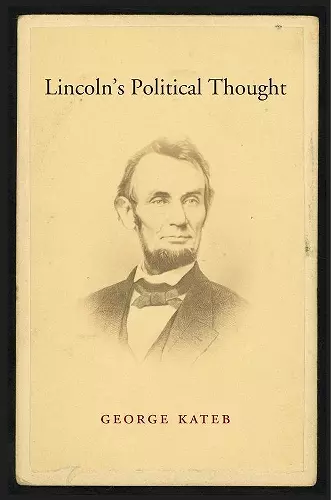Lincoln's Political Thought
Format:Hardback
Publisher:Harvard University Press
Published:2nd Feb '15
Currently unavailable, and unfortunately no date known when it will be back

One of the most influential philosophers of liberalism turns his attention to the complexity of Lincoln’s political thought. At the center of Lincoln’s career is an intense passion for equality, a passion that runs so deep in the speeches, messages, and letters that it has the force of religious conviction for Lincoln. George Kateb examines these writings to reveal that this passion explains Lincoln’s reverence for both the Constitution and the Union.
The abolition of slavery was not originally a tenet of Lincoln’s political religion. He affirmed almost to the end of his life that the preservation of the Union was more important than ending slavery. This attitude was consistent with his judgment that at the founding, the agreement to incorporate slaveholding into the Constitution, and thus secure a Constitution, was more vital to the cause of equality than struggling to keep slavery out of the new nation. In Kateb’s reading, Lincoln destroys the Constitution twice, by suspending it as a wartime measure and then by enacting the Thirteenth Amendment to abolish slavery. The first instance was an effort to save the Constitution; the second was an effort to transform it, by making it answer the Declaration’s promises of equality.
The man who emerges in Kateb’s account proves himself adequate to the most terrible political situation in American history. Lincoln’s political life, however, illustrates the unsettling truth that in democratic politics—perhaps in all politics—it is nearly impossible to do the right thing for the right reasons, honestly stated.
It is a delicate moral exercise, Kateb’s attempt to affirm Lincoln’s greatness while nonetheless chastening our idolatry and leaving us with a troubling image of ourselves. There are few writers since Emerson who have even attempted this sort of thing, let alone succeeded at it…Kateb refuses to simplify. The words in his book both bleed and provoke; his double-edged honesty cuts repeatedly against his own druthers, as he says what idolaters and debunkers alike wish not to hear…George Kateb has added a splendid and bracing chapter to [Emerson’s] Representative Men. -- Jeffrey Stout * Commonweal *
Unforgiving and original. -- David Bromwich * Reuters *
An erudite work that gently unravels the great man’s distortions and political expediency…The book is compelling throughout. * Kirkus Reviews *
Kateb is the most interesting and important philosopher of liberalism alive today, and whatever he says is worth thinking about. Although I disagree, sometimes heatedly, with many of the arguments here, it’s also a book I’m going to continue to think about, a book I’m going to have with me for a very long time. -- John Burt, author of Lincoln’s Tragic Pragmatism
I have read quite a few Lincoln books over the past few years, and Lincoln’s Political Thought is the most enjoyable. For those who know Kateb’s work – and I have been a fan of his for a long time – all of his characteristic flourishes are here on display. -- Steven Smith, editor of The Writings of Abraham Lincoln
- Nominated for Lincoln Prize 2016
- Nominated for New-York Historical Society American History Book Prize 2015
ISBN: 9780674368163
Dimensions: 210mm x 140mm x 23mm
Weight: 408g
256 pages